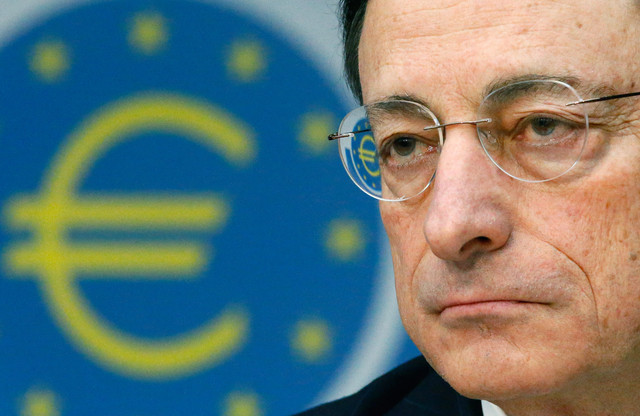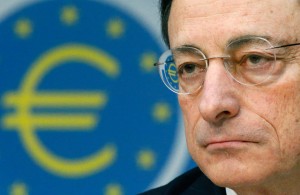
Ukraine Is Caught in a Tug of War
February 3, 2014
UK confirmed as fastest growing economy in Western Europe
February 3, 2014On the heels of last week’s decision
by the Federal Reserve to trim stimulus, central banks in Europe
will probably maintain a steady course this week. The European
Central Bank and the Bank of England will hold their key rates
at record lows, according to economists surveyed by Bloomberg.
The Reserve Bank of Australia will also keep its benchmark rate
at a record low.
In the U.S., employment probably rebounded in January and
the jobless rate held at a five-year low, while price increases
in Brazil were the smallest in more than a year.
BOE POLICY MEETING
— The Bank of England’s nine-member monetary policy
committee will leave its key rate at a record-low 0.5 percent
and its bond-purchase program target at 375 billion pounds ($617
billion), according to Bloomberg surveys before the decision on
Feb. 6.
— BOE officials are under pressure to reconsider their
forward guidance policy, under which they pledged not to
consider raising the benchmark rate until unemployment falls to
7 percent, after data showed the U.K. economy grew last year at
the fastest annual pace since 2007. Governor Mark Carney, who is
due to present new economic forecasts on Feb. 12, said the
recovery “has some way to run before it would be appropriate to
consider moving away from the emergency setting of monetary
policy.”
— “We expect no change in policy at the February
meeting,” Kevin Daly, chief U.K. economist at Goldman Sachs
Group Inc., wrote in a note to clients on Jan. 29. Revisions to
the guidance framework will probably be announced on Feb. 12 and
“we expect the MPC to replace the existing framework with one
based on a broader range of variables. Official rates are likely
to remain on hold for some time.”
ECB RATE DECISION
— The European Central Bank on Feb. 6 will keep its
benchmark interest rate unchanged at a record-low 0.25 percent,
according to the median forecast in a Bloomberg survey.
— Officials will have to decide whether recent volatility
in financial markets warrants a policy response. While
economists from Barclays Plc to Commerzbank AG have brought
forward expectations for an interest-rate cut, Dutch central
bank chief Klaas Knot said in an interview that he doesn’t see
an imminent need to act.
— “The most recent data give the ECB no reason to
reassess the inflation outlook and money market tensions seem to
be abating,” Dirk Schumacher, an economist at Goldman Sachs
Group Inc. in Frankfurt, said in a note to clients Jan. 28. “We
therefore do not expect any measures to be taken or announced at
next Thursday’s meeting, although the overall tone of the press
conference should be dovish.”
U.S. EMPLOYMENT
— Weather may again play havoc with the Labor Department’s
monthly jobs report. After the coldest December since 2009
chilled job growth to just 74,000 that month — the weakest gain
since the beginning of 2011 — below-freezing temperatures and
storms made forecasting January job growth more difficult.
Payrolls climbed by 180,000 workers last month, according to the
Bloomberg survey median before the Feb. 7 report. Estimates
ranged from gains of 105,000 to 270,000.
While employment typically bounces back in the month
following any weather-related slowdown, conditions around the
country remained poor. The report may also show the unemployment
rate held at a five-year low of 6.7 percent.
— “Usually, any weakness caused by weather is fully
reversed in the following month,” Peter D’Antonio, an economist
at Citigroup in New York, said in a Jan. 30 note. “However,
this time could be different,” he said. “Early January weather
was exceptionally cold as well, which may have limited the
bounce back.”
— “If weather was a factor in December’s payrolls
numbers, it’s going to be just as big a problem in January’s
numbers,” said Guy LeBas, chief fixed-income strategist at
Janney Montgomery Scott LLC. “We see little reason aside from
weather, however, that will shift the underlying trend of
180,000-200,000 monthly payrolls expansion. Still, even
considering the holidays and the weather, a second month of
below-trend payrolls numbers is going to raise the alarm in a
way that a single, easily dismissed, data point did not.”
AUSTRALIAN CENTRAL BANK
— Australia’s central bank will probably keep its
benchmark interest rate at a record-low 2.5 percent at its first
policy meeting for the year on Feb. 4, according to all 34
economists surveyed by Bloomberg. Economists will be focusing on
the Reserve Bank of Australia’s comments on the currency and
indications it may have dropped an easing bias.
— “The key issue is whether it would change the guidance
it has held since the August cut,” Paul Brennan, chief
economist in Australia for Citigroup Inc., said in a research
report. “While it was prudent to hold the cash rate steady
while continuing to gauge the effects of earlier reductions, it
didn’t want to close off the possibility of reducing it further
should that be appropriate to support sustainable growth in
economic activity, consistent with the inflation target.”
The RBA will issue updated economic forecasts in its
statement on monetary policy on Feb. 7.
BRAZILIAN INFLATION
— A report from Brazil’s statistics agency on Feb. 7 may
show inflation moderated to 5.66 percent in the first month of
2014. That would be the slowest since November 2012 after policy
makers raised benchmark interest rates for seven straight
meetings to ease consumer-price increases that still exceed the
4.5 percent target.
— “Food prices are in much better shape this year, which
is why you have this kind of relief,” said Roberto Padovani,
chief economist at Votorantim Ctvm Ltda in Sao Paulo. “But we
can’t miss the point that inflation is under pressure in
Brazil.”
— Regulated price increases will accelerate as the
government has stopped cutting electricity rates, partially
offsetting the impact of cheaper airfare in January, said Fabio Romao, an economist at LCA Consultores Ltda.
To contact the reporter on this story:
Vince Golle in Washington at
vgolle@bloomberg.net
To contact the editor responsible for this story:
Christopher Wellisz at
cwellisz@bloomberg.net


